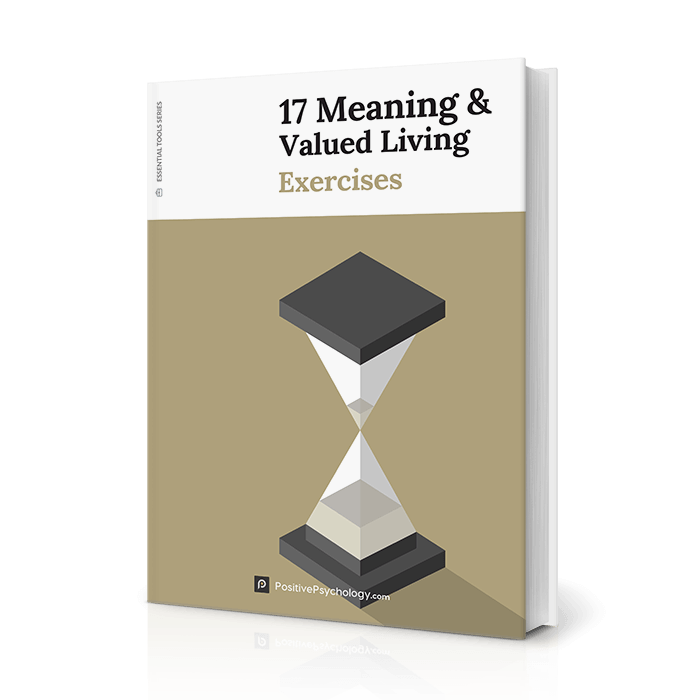What Does it Mean to Have a Sense of Coherence? (+Scale)
 According to Harvard Health, the Sense of Coherence Scale (SOC) is a scale that assesses how people view life and a scale that seeks to identify how people might use their resources to overcome resistance and maintain and develop their health.
According to Harvard Health, the Sense of Coherence Scale (SOC) is a scale that assesses how people view life and a scale that seeks to identify how people might use their resources to overcome resistance and maintain and develop their health.
The concept of a sense of coherence (SOC) originated from Aaron Antonovsky in 1979 to explain why some people become sick under stress while others stay healthy.
This concept has since gained widespread attention and has also been linked to health outcomes in many studies.
Before you continue, we thought you might like to download our three Meaning and Valued Living Exercises for free. These creative, science-based exercises will help you learn more about your values, motivations, and goals and will give you the tools to inspire a sense of meaning in the lives of your clients, students, or employees.
This Article Contains:
What is a Sense of Coherence? (Definition)
Sense of coherence or SOC is a mixture of optimism combined with a sense of control.
The SOC has three main components:
- Comprehensibility
- Manageability
- Meaningfulness
Comprehensibility, a cognitive aspect, refers to the extent to which you might perceive both internal and external stimuli as being understandable in some kind of rational way. (Eriksson and Mittelmark, 2017).
This might also have to do with having the ability to see things as orderly, coherent, clear, and structured.
The idea of being of able to make something structured out of a chaotic situation makes it much easier for us to understand the context in which we might see things or view life.
Manageability, a behavioral aspect, has to do with the degree to which we might feel that there are resources at our disposal. These resources might then be used to help manage the stimuli that we are constantly bombarded with. (Eriksson and Mittelmark, 2017).
Formal resources might include things like social services or care staff, while informal resources might include things like family or friends.
Manageability also has to do with our ability to cope and solve problems and be willing to invest our time and energy to solve those problems – in other words, to manage those problems and see them as a challenge rather than a burden.
Meaningfulness, a motivational aspect, has to do with the extent to which we feel that our lives have some kind of emotional meaning. This might also come into play when we face some sort of problem or challenge. (Eriksson and Mittelmark, 2017).
How Can Your Sense of Coherence Affect Your Mental Health?
 In a study done by Potier et al. (2017), a high sense of coherence can serve as a sense of protection from the burden of caregiving amongst older spouses.
In a study done by Potier et al. (2017), a high sense of coherence can serve as a sense of protection from the burden of caregiving amongst older spouses.
Those who care for others often experience stress, and those they care for may even feel like they are a burden.
Having a sense of coherence may help those types of people in terms of coping with this kind of stress.
Having a sense of coherence may also be an irrefutable factor for health outcomes and quality of life, according to the study.
In the study, 79 caregivers were recruited from an outpatient clinic. The average age was 79 years, with 53% of caregivers being women. Of the care recipients, 82% had some cognitive impairment.
The study results found that older caregivers with a high SOC reported a lower hardship confidence interval. A higher hardship confidence interval was associated with patient functional limitations.
The study surmised that having a high sense of coherence seemed to act as a protective factor against the hardship of caregiving.
Another study by Schafer et al. (2018) indicates that having a sense of coherence is also important for the mental health of ICU staff and anesthesiology.
It is well known that hospitals, especially intensive care units, are stressful and demanding places. Both nurses and physicians are constantly bombarded with various stressors, including team conflicts and patient’s deaths.
Several studies have shown increased rates of post-traumatic stress disorder symptoms and other mental health issues amongst staff.
According to the study, a high sense of coherence (SOC) and general resilience, as well as an internal locus of control (LOC), has been identified as important health-benefiting factors amongst medical staff.
Sense of coherence was found to be the most important correlate of both general mental health and PTSD symptoms, in the ICU and anesthesiology unit.
The research surmises that with further longitudinal studies, implementing interventions focused on the enhancement of SOC in training programs might be a promising approach to preventing or reducing psychopathological symptoms amongst this type of staff.
Aaron Antonovsky’s Work on the Topic
Aaron Antonovsky was a medical sociologist who named and developed the “SOC” concept as part of his research on the topic of health, stress and coping.
Antonovsky’s work was based around the question of why some people maintain a positive attitude and good health despite having hardships and stress in their lives, while others do not.
In other words, how is it that some people can easily manage their lives, while others cannot?
The answer, according to research done by Eriksson & Lindström (2007), was formulated in terms of a sense of coherence (SOC) and general resistance resources or GRRs.
Those with a high sense of coherence often have an enduring attitude. The SOC measures how people view life and how they manage stressful situations and how they identify and use their GRRs to maintain and develop their health.
The GRRs are things like money, intelligence, self‐esteem, preventive health orientation, social support, and cultural capital. People with these kinds of resources at their disposal tend to have a better chance of dealing with the challenges of life.
This is also known as the salutogenic concept.
The term ‘salutogenesis,’ refers to a theory of how and why certain people stay healthy. (Friedman, 2002).
What is interesting about this approach is that it doesn’t postulate a sense of control as the primary or even necessary characteristic of a healthy personality.
Antonovsky refers to a sense of coherence instead, which is central to successfully coping with challenges. When you have a sense of coherence, you see the world as something that is manageable, understandable, and meaningful.
The salutogenic framework – Dr. Gabriel Tung
The Sense of Coherence Scale and Questionnaire (PDF)
An excellent example of the sense of coherence 13-item scale can be found in research completed by Holmefur, Sundberg, Wettergren, & Langius-Eklöf, (2015) in the study, “Measurement properties of the 13-item sense of coherence scale using Rasch analysis.”
You can find a full-text PDF at Researchgate.net
A Look at the Two Versions (SOC-13) + (SOC-29)
 Antonovsky developed the (SOC-29) questionnaire to measure the sense of coherence.
Antonovsky developed the (SOC-29) questionnaire to measure the sense of coherence.
Eleven of those items measure comprehensibility, ten items measure manageability, and eight items measure meaningfulness.
The responses are measured on a semantic scale that ranges from one point to seven points. The questionnaire is designed to produce scores ranging from 29 to 203 points.
A shorter version of the scale was also developed, the SOC-13, which is a 13-question form.
In the shorter form developed by Antonovsky, the score ranges between 13 and 91 points.
Other scales have also been developed to measure the sense of coherence at the family level and the neighborhood level.
Antonovsky’s scales have been used in at least forty-nine different languages in forty-eight different countries.
According to Eriksson and Mittelmark (2017), the SOC appears to be a multidimensional construct rather than unidimensional as Antonovsky initially believed.
Antonovsky believed that one continued to develop and maintain their sense of coherence until approximately age 30 and throughout their adult life. However, Antonovsky also believed that after retirement that the sense of coherence diminished.
This assumption, however, finds no support in subsequent empirical research. However, as Antonovsky hypothesized, a wealth of research has shown his scales to be reliable, valid, and cross-culturally applicable instruments.
Is it a Valid Test?
The sense of coherence scales has been empirically tested in many different cultures, including Western cultures and cultures in Africa and Asia (Eriksson and Mittelmark, 2017). Studies have also been conducted on many different samples, including:
- General populations
- Different professions
- In persons with disabilities
- Different patient groups as well as in children, adolescents, adults, and elderly
- In families
- In organizations
- On a societal level
There have been some criticisms of the short nature of some versions of the test, specifically a three-item version.
This shorter version reflects the reality that in many applications, specifically healthcare, that questionnaires need to be short by design.
The SOC-29 and SOC-13 have also been criticized for having a lack of instruments to measure various psychometric properties, according to Eriksson and Mittelmark (2017).
It has also been suggested that the SOC concept does not adequately deal with the various mental or emotional issues of the experience of life.
Other criticisms include a conclusion that the SOC-29 and SOC-13 are only moderately related to different measures of physical health. (Eriksson and Mittelmark, 2017).
Antonovsky also assumed that one’s internal and external environment had to be predictable for that person to have a high sense of coherence.
On the other hand, some say that predictability should not be included when it comes to measuring and conceptualizing a sense of coherence and that a lack of predictability is not necessarily something that suggests a lack of health. (Eriksson and Mittelmark, 2017).
According to some, unpredictability is the thing that makes life matter in the first place, so there have been differing opinions on this theory that predictability is key to a sense of coherence.
Having a sense of unpredictability can provide a state of initiative and energy as well as a positive attitude.
Since the SOC-29 includes several such items that have to do with the idea of predictability, some researchers have deemed this instrument as flawed. (Eriksson and Mittelmark, 2017).
A Take-Home Message
Much of this concept is built on the idea of salutogenesis, which is an approach to human health that examines the factors that may contribute to the promotion and maintenance of physical and mental wellbeing rather than disease.
This concept also has a lot to do with someone’s coping mechanisms, which can help preserve a state of vital health despite stressful conditions.
A focus on health and people’s resources is a broad concept and much more than the mere measurement of a sense of coherence.
The idea of salutogenesis as an umbrella concept with many different theories and concepts involved.
We have seen that Antonovsky believed that one’s sense of coherence tends to diminish after retirement.
This assumption, according to Eriksson and Mittelmark (2017) finds no support in subsequent empirical research.
One’s sense of coherence seems to be something that is relatively stable over time, but not quite as stable as Antonovsky once assumed.
Research has shown that sense of coherence is something that develops over the entire cycle of life and may even increase with age (Eriksson and Mittelmark, 2017).
It does seem like more research is needed to further examine the idea of a sense of coherence and how it holds up over time and throughout one’s lifetime.
We hope you enjoyed reading this article. Don’t forget to download our three Meaning and Valued Living Exercises for free.
- Antonovsky, A. (1987). Unraveling the mystery of health. How people manage stress and stay well. San Francisco: Jossey-Bass Publishers.
- Bengel, J., Strittmatter, R., & Willman, H. (1999). What keeps people healthy? The current state of discussion and the relevance of Antonovsky’s salutogenic model of health. Cologne: Federal Centre for Health Education (FCHE).
- Cham (CH): Springer; 2017. Chapter 12. Available from: https://www.ncbi.nlm.nih.gov/books/NBK435830/
- Eriksson, M., & Lindström, B. (2006, May). Antonovsky’s sense of coherence scale and the relation with health: A systematic review. Retrieved from https://www.ncbi.nlm.nih.gov/pmc/articles/PMC2563977/
- Eriksson, M., & Lindström, B. (2007). Antonovsky’s sense of coherence scale and its relation with quality of life: a systematic review. Journal of epidemiology and community health, 61(11), 938–944.
- Eriksson M, Mittelmark MB. The Sense of Coherence and Its Measurement. 2016 Sep 3. In: Mittelmark MB, Sagy S, Eriksson M, et al., editors. The Handbook of Salutogenesis [Internet].
- Feldt, T., Lintula, H., Suominen, S., Koskenvuo, M., Vahtera, J., & Kivimäki, M. (2007). Structural validity and temporal stability of the 13-item sense of coherence scale: Prospective evidence from the population-based HeSSup study. Quality of Life Research, 16(3), 483–493. [PubMed] [CrossRef]
- Feldt, T., Leskinen, E., Koskenvuo, M., Suominen, S., Vahtera, J., & Kivimäki, M. (2011). Development of sense of coherence in adulthood: A person-centered approach. The population-based HeSSup cohort study. Quality of Life Research, 20(1), 69–79. [PubMed]
- Flensborg-Madsen, T., Ventegodt, S., & Merrick, J. (2005b). Why is Antonovsky’s sense of coherence not correlated to physical health? Analysing Antonovsky’s 29-item Sense of Coherence Scale (SOC-29). The Scientific World Journal, 5, 767–776. [PMC free article] [PubMed] [CrossRef]
- Friedman, H. S. (2002, November 02). Personality and Health. Retrieved from https://www.sciencedirect.com/science/article/pii/B0080430767038043
- Geyer, S. (1997). Some conceptual considerations on the sense of coherence. Social Science & Medicine, 44(12), 1771–1779. [PubMed] [CrossRef]
- Holmefur, M., Sundberg, K., Wettergren, L., & Langius-Eklöf, A. (2015). Measurement properties of the 13-item sense of coherence scale using Rasch analysis. Quality of Life Research, 24(6), 1455–1463.
- Mattiuzzi, P. G. (n.d.). The Sense of Coherence*. Retrieved from https://www.everydaypsychology.com/2007/04/sense-of-coherence.html#.XSISA5NJFTY
- Potier, F., Degryse, J., Henard, S., Aubouy, G., & Saint-Hubert, M. (2017, November 24). A high sense of coherence protects from the burden of caregiving in older spousal caregivers. Retrieved July 7, 2019, from https://www.sciencedirect.com/science/article/abs/pii/S0167494317303369
- Sense of Coherence Scale. (2017, March 30). Retrieved from https://www.hsph.harvard.edu/health-happiness/sense-of-coherence-scale/
- Sarah K., L., Johanna, Groesdonk, Heinrich, Volk, Thomas, . . . Tanja. (2018, August 24). Mental Health in Anesthesiology and ICU Staff: Sense of Coherence Matters. Retrieved July 7, 2019, from https://www.frontiersin.org/articles/10.3389/fpsyt.2018.00440/full
Let us know your thoughts
Read other articles by their category
- Body & Brain (49)
- Coaching & Application (57)
- Compassion (26)
- Counseling (51)
- Emotional Intelligence (24)
- Gratitude (18)
- Grief & Bereavement (21)
- Happiness & SWB (40)
- Meaning & Values (26)
- Meditation (20)
- Mindfulness (45)
- Motivation & Goals (45)
- Optimism & Mindset (34)
- Positive CBT (28)
- Positive Communication (20)
- Positive Education (47)
- Positive Emotions (32)
- Positive Leadership (18)
- Positive Parenting (4)
- Positive Psychology (33)
- Positive Workplace (37)
- Productivity (16)
- Relationships (46)
- Resilience & Coping (36)
- Self Awareness (21)
- Self Esteem (37)
- Strengths & Virtues (31)
- Stress & Burnout Prevention (34)
- Theory & Books (46)
- Therapy Exercises (37)
- Types of Therapy (64)





What our readers think
It is a very interesting article! A new point of view on the contemporary challenge made by chaos of information. It makes a reader to think seriously
P.s. Greetings from Ukraine!
Hi, I would like to ask if the score measured in the scale is equal to for example 56 points, does it mean that the soc is high? thank you.
I would like to use these questionnaires in my mental health practice to help my providers do assessments with their clients. But I do not see a simple straight forward way to score the results can you help me with this please?
Hi Elaine,
Thank you for your question. This article should be useful for you as it talks about the scoring of the SOC-29 and SOC-13.
I hope this helps.
Kind regards,
-Caroline | Community Manager
Hi, I am a student of MA Psychology and wanted to use this scale for my dissertation, could you please guide me as to how i can get this scale and its norms?
Thankyou!
Hi Tazeen,
You can find the items and accompanying information about the scale in the original paper by Holmefur et al. (2014) here on ResearchGate.
Hope this helps!
– Nicole | Community Manager
Thank you for sharing Nicole.
Hello
I was wondering whether you need to seek permission to use SOC 13 questionnaire/scale for research purposes or not . If permission is needed how to gain it ? Your advice would be much appreciated.
Hi Syeda,
No, this scale is freely available to use for research purposes without needing permission from the authors. You’ll find all the items in Table 1 of Holmefur et al. (2014).
Hope this helps!
– Nicole | Community Manager
Thank you.
Regards.
Hi, won’t it be plagiarism if we use it without the consent of the author? Hope you can answer my question.
Hi Andrea,
As long as you’re using it for research and not commercial purposes, you can freely use scales published in journal articles without permission from the author as long as you include a reference and citation. It’s actually considered good practice to use scales developed and validated by other researchers to achieve comparability across studies, and it benefits the original creators when others use their scales 🙂
– Nicole | Community Manager
Am a lecturer from animal science department, university of Maiduguri, Nigeria. Am passionate about enhancing my English language communication both written and spoken.